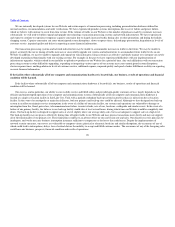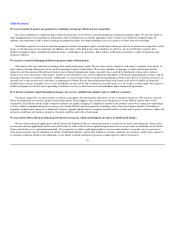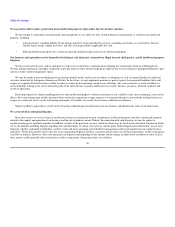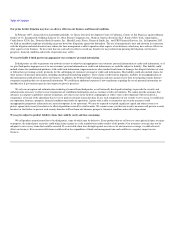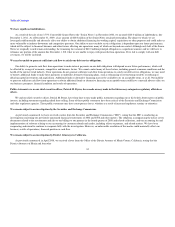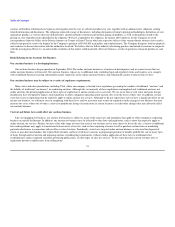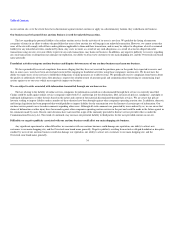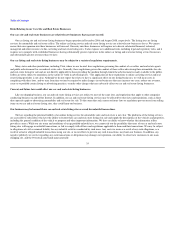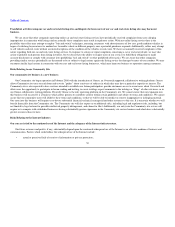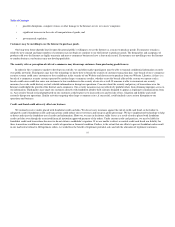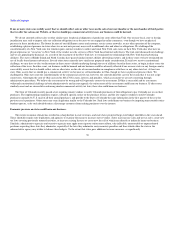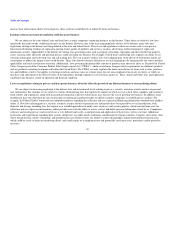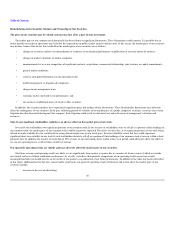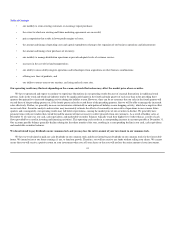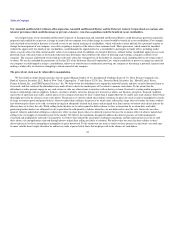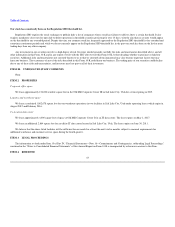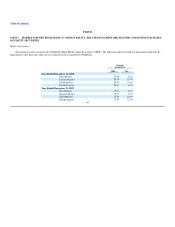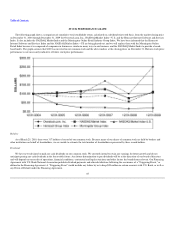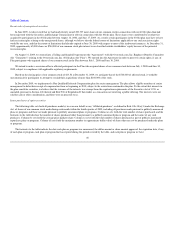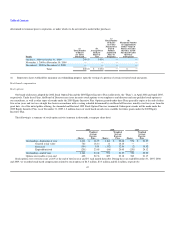Overstock.com 2009 Annual Report Download - page 41
Download and view the complete annual report
Please find page 41 of the 2009 Overstock.com annual report below. You can navigate through the pages in the report by either clicking on the pages listed below, or by using the keyword search tool below to find specific information within the annual report.
Table of Contents
If one or more states successfully assert that we should collect sales or other taxes on the sale of our merchandise or the merchandise of third parties
that we offer for sale on our Website, or that we should pay commercial activity taxes, our business could be harmed.
We do not currently collect sales or other similar taxes for physical shipments of goods into states other than Utah. One or more local, state or foreign
jurisdictions may seek to impose sales tax collection obligations on us because we are engaged in online commerce, even though we have no physical
presence in those jurisdictions. The future location of our fulfillment centers and customer service center networks, or any other operation of the company,
establishing a physical presence in states where we are not now present, may result in additional sales and other tax obligations. We challenged the
constitutionality of a New York state law which requires internet retailers to collect and remit New York sales taxes on their New York sales who have no
physical presence or "tax nexus" in New York, if the retailer uses the services of New York based internet advertisers. The trial court dismissed our challenge,
and we are appealing the dismissal. As a result of the enactment of the New York law, we terminated our relationship with New York based advertising
affiliates. The states of Rhode Island and North Carolina have passed similar internet affiliate advertizing statutes, and in those states we have terminated our
use of locally based internet advertisers. Several other states currently have similar tax proposals under consideration. If such laws survive constitutional
challenge, we may have to elect to discontinue in those states valuable marketing through the use of affiliates based in those states, or begin in those states the
collection of the taxes. In either event, our business could be harmed and our business could be adversely affected if one or more states or any foreign country
successfully asserts that we should collect sales or other taxes on the sale of our merchandise in compliance with these or any other state law. At least one
state, Ohio, asserts that we should pay a commercial activity tax because we sell merchandise in Ohio, though we have no physical presence there. We
challenged in Ohio state court the constitutionality of the commercial activity tax; however, the court declined the case for the reason that it was not a ripe
controversy, whereupon the state of Ohio assessed us $612,784 in taxes, interest, and penalties, which assessment we are now contesting through
administrative procedures. We believe the assessment to be wrong and will vigorously contest the assessment. If Ohio is successful and its assessment
withstands constitutional challenge in both administratively and in court appeals, the enforcement of the assessment could harm our business. If other states
similarly enact and are successful in enforcing similar commercial activity tax laws, these also could harm our business.
The State of Colorado recently passed a law requiring remote vendors to notify Colorado purchasers of their obligation to pay Colorado use tax on their
purchases. The implementing regulations require a detailed, specific notice on the purchase invoice, and the law requires vendors to notify Colorado
purchasers annually by U.S. mail of all their annual purchases, and provide to the State of Colorado the same information in the first quarter of the year for
previous year's purchases. Other states may enact legislation similar to the Colorado law. Such laws could harm our business by imposing unreasonable notice
burdens upon us, or by such detailed notices, discourage customers from making purchases over the internet.
Economic pressure on states could harm our business.
The current economic climate has resulted in a sharp decline in state revenues, and states have projected large state budget shortfalls in the years ahead.
These shortfalls require state legislatures and agencies to examine the means to increase state revenues. States may increase sales and use tax rates, create new
tax laws covering previously untaxed activities, or increase existing licenses or create new fees all of which may directly or indirectly harm our business.
Similarly, administrative agencies and executive agencies may apply more rigorous enforcement efforts, take inflexible, unreasonable or unprecedented
positions respecting these laws they administer, especially if the laws they administer carry monetary penalties and fines which either the state or the
administrative agency may utilize to balance their budgets. To the extent that states pass additional revenue measures, or significantly
38


